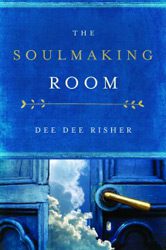 This post is part of a conversation on the new book The Soul-Making Room by Dee Dee Risher, for the Patheos Book Club.
This post is part of a conversation on the new book The Soul-Making Room by Dee Dee Risher, for the Patheos Book Club.
Philosopher Alfred North Whitehead claims that religion, at its best, aims at world loyalty. It begins, as the philosopher notes, with solitude, with our own personal experiences of the holy and the privacy inherent in every life, but recognizes what I call “the grace of interdependence,” recognizing that each moment is a gift of the environment as well as our choices and contributes to the world beyond itself. Much of who we are comes from the impact of family, culture, economics, and politics, from which our limitations and possibilities emerge. As part of this grace of interdependence, our lives, consciously or unconsciously, are our gifts to God.
Dee Dee Risher has written an insightful and honest book, exploring how we can live simply, consciously, and globally, and yet nurture our families and spiritual lives. Not holier than thou in approach, as many writings and testimonies of social activists and simple livers are, she expresses the ambiguities and challenges of living simply so that others can simply live, going green in a society based on consumption, and balancing her children’s well-being with commitment to inner city public schools. I share this ambivalence, although I have taken a different external path, for example, in choosing to live in the suburbs to insure quality education and a safe learning environment for our son.
I recognize that I am a not-so-innocent bystander. I do not apologize for my life choices or who I am – the latter is simply the given from which my limitations and possibilities emerge – but I have come to recognize and hopefully respond with grace and intentionality to the ambiguity of benefitting from white privilege while being committed to the image of God in all people; supporting national security and a strong national defense while being a pacifist in my daily interactions and challenging global interventionism; living in a nine room, three bathroom home while encountering the homeless and supporting the local shelter and Habitat for Humanity in my Cape Cod town; practicing ecological intentionality while owning two cars and flying whenever my work or play necessitates it; being concerned for economic equality while living comfortably and regularly checking my retirement investments. I am one of the anxious affluent and worried well, having more largesse than most of the world and many of my fellow citizens in otherwise upper middle class Cape Cod, but also worried that it will be enough to support me should I live into my nineties.
Whitehead’s comment helps me find my way spiritually and ethically. First, it reminds me that self-interest is built into the nature of life. “If I am not for myself (and my family and church), who will be?” as Rabbi Hillel opined. My calling is to be as creative as possible and to embody as much beauty and love possible, congruent with the well-being of others. I am grateful – and recognize that I have no entitlement – to the leisure and largesse to read Risher’s book, write this blog, walk on the beach each morning for prayer and exercise, write books, teach at a seminary, pastor a church, and spend quality time with my wife and grandchildren. These are activities many cannot even imagine, given the realities of economics, social structure, and family situation. I can aspire to the top rungs of Maslow’s hierarchy of values due to the accidents of birth as well as my own creativity and initiative.
Self-interest enters into decisions I’ve made about school, travel, benevolence, and social involvement. I have had choices and I am painfully aware that others do not.
I need to make the most of my gifts, freedoms, and privilege, but as Hillel also says, “If I am only for myself, what am I?” That’s where world loyalty comes in. Self-interest must be balanced by world loyalty, and the willingness to live more simply so that others might simply life. This is the calling to use my resources to benefit and not destroy – although some destruction is inevitable – the world in which I live. As a resident of a beach community, I am aware of the realities of global climate change, and they call me to consider the rising ocean and species destruction, as well as my enjoyment of beauty.
World loyalty involves what Mother Teresa of Calcutta counseled, “Do something beautiful for God.” Ethics involves considering with our decisions: Are we giving God a more beautiful or uglier world? What actions tip the scales toward life for the most vulnerable and for the planet?
Hillel concludes by saying, “If not now, when?” To me this is the call of the uneasy conscience. This is not paralysis, but the recognition that our privilege, economics, self-interest, and imperfection are not impediments to seeking the highest good for others in all my short term and long term decisions. Jewish mystics say that when you save a soul, you save the world. I would add that each act can contribute to saving the world, and let me – in my own ambivalence and ambiguity – do the best I can to be faithful to myself and “my” people and the world and persons I’ll never meet. I conclude with gratitude to Risher’s book that invites us to an uneasy conscience and commit ourselves to lives that bring beauty to this good Earth.












